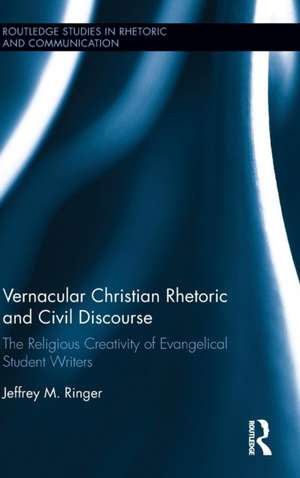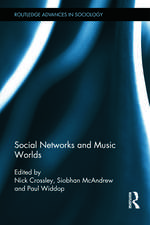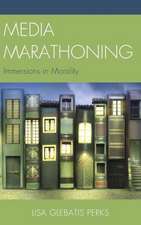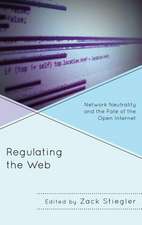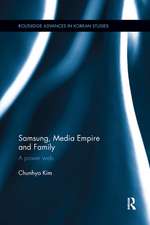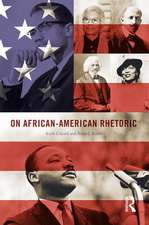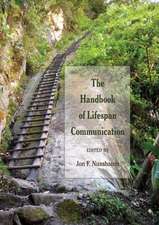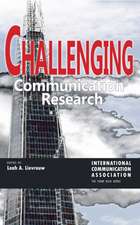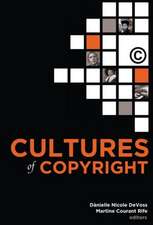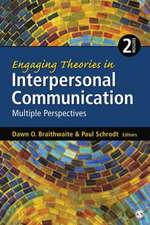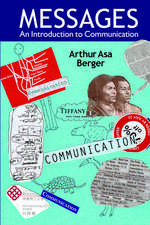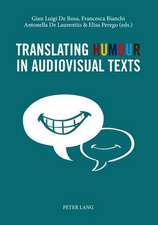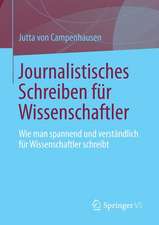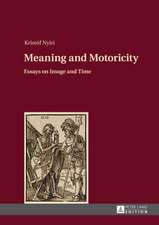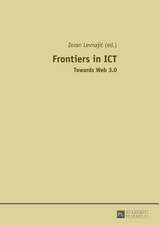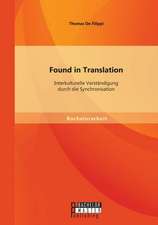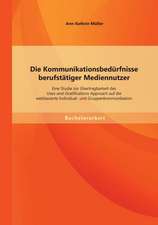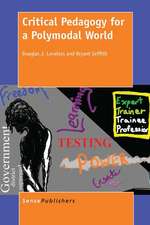Vernacular Christian Rhetoric and Civil Discourse: The Religious Creativity of Evangelical Student Writers: Routledge Studies in Rhetoric and Communication
Autor Jeffrey M. Ringeren Limba Engleză Hardback – 19 feb 2016
| Toate formatele și edițiile | Preț | Express |
|---|---|---|
| Paperback (1) | 429.41 lei 43-57 zile | |
| Taylor & Francis – 3 ian 2018 | 429.41 lei 43-57 zile | |
| Hardback (1) | 1163.66 lei 43-57 zile | |
| Taylor & Francis – 19 feb 2016 | 1163.66 lei 43-57 zile |
Din seria Routledge Studies in Rhetoric and Communication
-
 Preț: 386.43 lei
Preț: 386.43 lei -
 Preț: 362.49 lei
Preț: 362.49 lei - 18%
 Preț: 1001.07 lei
Preț: 1001.07 lei -
 Preț: 462.63 lei
Preț: 462.63 lei - 18%
 Preț: 312.43 lei
Preț: 312.43 lei -
 Preț: 389.38 lei
Preț: 389.38 lei -
 Preț: 309.69 lei
Preț: 309.69 lei - 20%
 Preț: 373.53 lei
Preț: 373.53 lei -
 Preț: 465.49 lei
Preț: 465.49 lei - 18%
 Preț: 997.90 lei
Preț: 997.90 lei -
 Preț: 388.16 lei
Preț: 388.16 lei -
 Preț: 363.00 lei
Preț: 363.00 lei - 18%
 Preț: 1218.12 lei
Preț: 1218.12 lei - 18%
 Preț: 1060.87 lei
Preț: 1060.87 lei - 18%
 Preț: 1106.02 lei
Preț: 1106.02 lei - 18%
 Preț: 1113.45 lei
Preț: 1113.45 lei -
 Preț: 317.48 lei
Preț: 317.48 lei -
 Preț: 436.14 lei
Preț: 436.14 lei - 18%
 Preț: 1004.20 lei
Preț: 1004.20 lei -
 Preț: 411.42 lei
Preț: 411.42 lei -
 Preț: 449.41 lei
Preț: 449.41 lei - 18%
 Preț: 1116.38 lei
Preț: 1116.38 lei - 15%
 Preț: 421.44 lei
Preț: 421.44 lei - 18%
 Preț: 1166.68 lei
Preț: 1166.68 lei - 18%
 Preț: 1059.14 lei
Preț: 1059.14 lei - 26%
 Preț: 875.55 lei
Preț: 875.55 lei - 37%
 Preț: 184.00 lei
Preț: 184.00 lei - 18%
 Preț: 1109.99 lei
Preț: 1109.99 lei - 18%
 Preț: 1053.16 lei
Preț: 1053.16 lei - 18%
 Preț: 1057.05 lei
Preț: 1057.05 lei - 18%
 Preț: 1330.34 lei
Preț: 1330.34 lei - 30%
 Preț: 849.29 lei
Preț: 849.29 lei -
 Preț: 462.63 lei
Preț: 462.63 lei - 18%
 Preț: 1218.08 lei
Preț: 1218.08 lei - 18%
 Preț: 1056.71 lei
Preț: 1056.71 lei - 18%
 Preț: 1056.35 lei
Preț: 1056.35 lei
Preț: 1163.66 lei
Preț vechi: 1419.11 lei
-18% Nou
Puncte Express: 1745
Preț estimativ în valută:
222.74€ • 242.02$ • 187.22£
222.74€ • 242.02$ • 187.22£
Carte tipărită la comandă
Livrare economică 21 aprilie-05 mai
Preluare comenzi: 021 569.72.76
Specificații
ISBN-13: 9781138951686
ISBN-10: 1138951684
Pagini: 216
Dimensiuni: 152 x 229 x 18 mm
Greutate: 0.45 kg
Ediția:1
Editura: Taylor & Francis
Colecția Routledge
Seria Routledge Studies in Rhetoric and Communication
Locul publicării:Oxford, United Kingdom
ISBN-10: 1138951684
Pagini: 216
Dimensiuni: 152 x 229 x 18 mm
Greutate: 0.45 kg
Ediția:1
Editura: Taylor & Francis
Colecția Routledge
Seria Routledge Studies in Rhetoric and Communication
Locul publicării:Oxford, United Kingdom
Public țintă
Postgraduate and UndergraduateCuprins
1. From Problem to Possibility: Evangelical Christian Students, Composition Studies, and Civil Discourse 2. Vernacular Religious Creativity: Lived Religion and Evangelical Christianity 3. Creating Deliberative Conversation: Toward Inventional Creativity 4. Effective Witness, Faithful Witness: Austin, Casuistic Stretching, and the Desire for Legitimacy 5. The Problem and Possibility of Ethos: Articulating Faith in Kimberly’s Schooled Writing 6. Changing the Way We Speak: Eloise, Inclusion, and Constitutive Rhetoric 7. Coming to Terms: Toward a Pedagogy of Values Articulation Appendix A: Methodology Appendix B: The National Study of Youth and Religion as Context
Recenzii
"I find Jeff Ringer’s scholarship to be outstanding: in what it offers to the field, in its use of empirical research, in its conclusions, and in its recommendations. The goal of this book—improving our chances of engaging in civil discourse—is terrifically important, and Ringer helps readers see a path toward accomplishing that goal." --Elizabeth Vander Lei, Calvin College, USA
"Ringer introduces a novel focus into discussions of religious students in the classroom, emphasizing that the current generation should be understood as ‘millennial evangelicals,’ who are much more open to dialogue with different views than their elders may have been." -- Patricia Bizzell, College of the Holy Cross, USA
"Ringer introduces a novel focus into discussions of religious students in the classroom, emphasizing that the current generation should be understood as ‘millennial evangelicals,’ who are much more open to dialogue with different views than their elders may have been." -- Patricia Bizzell, College of the Holy Cross, USA
Descriere
This book reveals that the evangelical Christian faith of contemporary college students—and the rhetorical practice motivated by it—is marked by an openness to social context and pluralism that offers possibilities for civil discourse. Based on case studies of evangelical Christian student writers, contextualized within nationally-representative trends as reported by the National Study of Youth and Religion, and grounded in scholarship from rhetorical theory, composition studies, folklore studies, and sociology of religion, tghis book offers rhetorical educators a new terministic screen that reveals the complex processes at work within our students’ vernacular constructions of religious faith.
